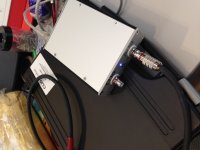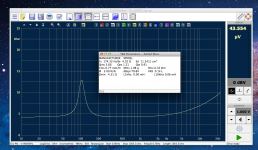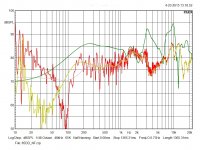You have good range of 13in apple laptops and You can have OSX and WIN
even LYN...
.
cheers
Already done that.
CLIO has finally published the specs and user manual for the Pocket
CLIO Pocket | Audiomatica Srl
No info on pricing yet though.
Functional wise it's not equal to CLIO FW, but seems to be good choice for
* frequency responses, FFT etc
* impedance
* T/S measurements
* component R/L/C measurements
CLIO Pocket | Audiomatica Srl
No info on pricing yet though.
Functional wise it's not equal to CLIO FW, but seems to be good choice for
* frequency responses, FFT etc
* impedance
* T/S measurements
* component R/L/C measurements
I looked at the manual and I saw quite a few things missing from the capabilities. Phase????, No MLS... , It appeared to have limited capabilities to remove time of flight. No ability to combine near-field and far-field. I'm not sure how I could get usable data from this.. Too bad its not compatible with older Clio software.
It looks like I will have to keep my desktop around.....
It looks like I will have to keep my desktop around.....
And seems limited to 98K sample rate, when my ClioFW goes to 192K.
I wonder how much they would want for it?
.
I wonder how much they would want for it?
.
No MLS... , No ability to combine near-field and far-field. ....
The lack of MLS is not a problem if you have LogChirp, but unable to combine near-field and far-field? That's terminal if you ask me, what were they thinking?
.
USB version of ClioFW ?
Can we guess that Audiomatica will be working on a USB version of the Clio FW ?
Everywhere I see them saying that Firewire is practically dead ! Computers in a few years time may have only USB and add on cards for Firewire may be hard to come by AND be incompatible with Clio FW.
Having a USB would make it very flexible with time.
For my Clio 4.52 I had to keep a separate computer as a spare as the card will not fit into newer machines. The present computer is getting flaky and maybe the spare PC I kept might not work at all due to lack of use ! Oxidised contacts ( big problems on memory cards) and old hard drives etc.
All my newer PC's have no socket for the Clio 4.52 card.
Can we guess that Audiomatica will be working on a USB version of the Clio FW ?
Everywhere I see them saying that Firewire is practically dead ! Computers in a few years time may have only USB and add on cards for Firewire may be hard to come by AND be incompatible with Clio FW.
Having a USB would make it very flexible with time.
For my Clio 4.52 I had to keep a separate computer as a spare as the card will not fit into newer machines. The present computer is getting flaky and maybe the spare PC I kept might not work at all due to lack of use ! Oxidised contacts ( big problems on memory cards) and old hard drives etc.
All my newer PC's have no socket for the Clio 4.52 card.
Everywhere I see them saying that Firewire is practically dead !
Not dead but evolving. Intel's Thunderbolt is a superset which includes Firewire. A simple adaptor turns a Thunderbolt port into a Firewire port.
dave
OK, I looked over the final literature for the Pocket, and it looks much better than the early information. I'm a little surprised that the manual isn't better. The manual for my Cliowin 8.5 was very detailed and perfectly written. The pocked looks to be more of a quick and dirty overview. That being said, I would say that it has most of what you would need to build a speaker. It's still missing a few things, but those probably won't be missed by the hobbyist.
The Pocket doesn't have a User Guide so far. They call it the Survival Guide ! Maybe the full fledged manual may come later .
Clio fw cannot detect on windows 8.1 via Macbook boot camp
Hi Guys,
Recently I bought Clio 11, I am having problem in the Clio fw detection. It simply cannot detect it. When I open Clio 11 software, the error msg saying, cannot detect hardware, error 16.
I am using MacBook Pro retina, windows 8.1 installed via boot camp.
Can someone advise me....thank you.
Frederick
Hi Guys,
Recently I bought Clio 11, I am having problem in the Clio fw detection. It simply cannot detect it. When I open Clio 11 software, the error msg saying, cannot detect hardware, error 16.
I am using MacBook Pro retina, windows 8.1 installed via boot camp.
Can someone advise me....thank you.
Frederick
CLIO Pocket
My CLIO Pocket has arrived! I like it using USB and the software supporting both Windows and OSX. It was initially tested in both WIN 7 PRO and OSX 10.7 (MBP) without any issue.
The current software does not support post data processing (add, subtract, etc.) as CLIO-10. For near and far-field splicing, I need to export data to ASCII files first and do that in, say, Excel or Response Blender by Charlie and Jeff.
I have been using LogChirp in other software like ARTA and REW. It is as good as MLS. In fact, LogChirp has better low-freq noise suppression in my test environment.
When you use it as an LCR meter, sampling frequency must be 48 kHz. It should not be a real limitation in practice. Since I will use it only for speaker measurement, 96 kHz is very sufficient.
My CLIO Pocket has arrived! I like it using USB and the software supporting both Windows and OSX. It was initially tested in both WIN 7 PRO and OSX 10.7 (MBP) without any issue.
The current software does not support post data processing (add, subtract, etc.) as CLIO-10. For near and far-field splicing, I need to export data to ASCII files first and do that in, say, Excel or Response Blender by Charlie and Jeff.
I have been using LogChirp in other software like ARTA and REW. It is as good as MLS. In fact, LogChirp has better low-freq noise suppression in my test environment.
When you use it as an LCR meter, sampling frequency must be 48 kHz. It should not be a real limitation in practice. Since I will use it only for speaker measurement, 96 kHz is very sufficient.
Attachments
My CLIO Pocket has arrived! I like it using USB and the software supporting both Windows and OSX. It was initially tested in both WIN 7 PRO and OSX 10.7 (MBP) without any issue.
The current software does not support post data processing (add, subtract, etc.) as CLIO-10. For near and far-field splicing, I need to export data to ASCII files first and do that in, say, Excel or Response Blender by Charlie and Jeff.
I have been using LogChirp in other software like ARTA and REW. It is as good as MLS. In fact, LogChirp has better low-freq noise suppression in my test environment.
When you use it as an LCR meter, sampling frequency must be 48 kHz. It should not be a real limitation in practice. Since I will use it only for speaker measurement, 96 kHz is very sufficient.
The software limitations, nearfield/farfield splicing, is disappointing. But if you have Clio 10 software, I suspect they can be imported there?
Logchirp is definitely superior to MLS and also much faster.
96KHz is OK for most things, agreed.
How much all up did it cost?
Cheers, Joe
.
The software limitations, nearfield/farfield splicing, is disappointing. But if you have Clio 10 software, I suspect they can be imported there?
Logchirp is definitely superior to MLS and also much faster.
96KHz is OK for most things, agreed.
How much all up did it cost?
Cheers, Joe
.
The Pocket software can import MLS files generated by CLIO-10. However, it save in a different format CRP (logchirp).
I ordered it from a UK dealer. It is £439.
Sorry, you can do near and far-field by the merge processing.
Math processing: Add, divide, merge, dB shift and mic in box. Impulse data can be exported as WAV file for further processing.
The current software does not do THD. On the other hand, it measures DC resistance of a driver. I can't recall whether CLIO-10 has this feature or not.
Math processing: Add, divide, merge, dB shift and mic in box. Impulse data can be exported as WAV file for further processing.
The current software does not do THD. On the other hand, it measures DC resistance of a driver. I can't recall whether CLIO-10 has this feature or not.
Last edited:
Seems Audiomatica has improved many aspects of Pocket in latest SW update.
http://www.audiomatica.com/wp/wp-content/uploads/Pocket-Pills.pdf
- Phase response (Normal, Minimum and Excess)
- Math processing: Add file
- Math processing: Divide by file
- Math processing: Merge High and Low frequency response
- Math processing: dB Shift
- Math processing: MIB (Microphone In the Box) technique
http://www.audiomatica.com/wp/wp-content/uploads/Pocket-Pills.pdf
- Phase response (Normal, Minimum and Excess)
- Math processing: Add file
- Math processing: Divide by file
- Math processing: Merge High and Low frequency response
- Math processing: dB Shift
- Math processing: MIB (Microphone In the Box) technique
I have one in-house at the moment for review and have done some preliminary work with it. It has been incredibly easy to use. I'd be curious about anyone else's opinions.
What does " CLIO POCKET SOFTWARE REL.1.1 UNDER X-RAYS " mean at the bottom of each page on the PDF information page ?
So, on Clio 8.5 the manual clearly gave the procedure to remove time of flight. I want data that is ready for crossover design. If I recall this was minium phase. I see options in Pocket to view various phase options but it doesn't seem to remove time of flight and output the correct phase with the txt file. Am I just not getting it or is anyone else having the same problem?
Hello Joe,
I have use these Adapter cards for Years for portable measurement with analyzers for some other things an they works flawlessly under W7 x64 (my case) on three different 17'' Lenovo notebooks and are fare better than orig. inst. on motherboard, they use Ti Chip, none inst. necessary, only plug it into a slot, (hot swap) and it works in a second.
- The most import. thing for fire-wire connection to function is:
DEINSTALL ALL MS garbage & Junk soft from the comp, close all services not needed and add a 1394a process to highest priority !!!
Min 2.core Proc, min 4, best 8GB RAM 🙂
If You Must use the comp for other things also frequently than make at least 2 user accounts and let it be the second - (MEASUREMENT) ONLY !! Please apply here all previously mentioned steps, and make You or ( Measurement) account - a full Admin. priority and use ur Meas. Syst. under full advanced (user - admin) properties ALWAYS (run as as administrator) and You'll work like charm !
If You want to work and not jocking than:
Don't buy a fancy look crap Acer or many other fancy super ultra light crap mini laptops !
Instead go to some local computer guru who each 2.yrs. replace the HiQ - engineered Lenovo WorkHorse Laptops in some fancy bankers or some other bureaucracy firms with the latest top models and get one 2.yrs. used
for a cheapo and You'll never look back or even regret !
For the money saved this way please make ur dearest some nice & tasteful dinners in some nice place You know they're do an You'll win win..... 🙂
Please see here You can order the best adapter 1394 Cards:
1. Firewire PCMCIA Express IEEE 1394
or for older laptops:
2. PCMCIA PC CardBus to FireWire IEEE 1394
Hope You'll begin work sooner before You become a $$ Golden Retriever
cheers:
Andreas:
Thanks 🙂
I have had some serious problems with my ClioFW 10 setup so any advice that would help me get this system working is much appreciated.
There is an pcmcia 1394a (TI chipset) expansion card on the way and my Clio-box chould be back from service any day now.
I'm preparing for it to hopefully work this time.
I'm only going to use the computer exclusivly for Clio so now I'm looking at what I can delete and unactivate in the Windows installation.
If someone already has gone trough this procedure, what are the nessecary processes and services needed for an exlusive Clio setup ?
Is there a workorder on how to manage this ? Maybe setting all services in "manual" rebooting the computer, start Clio and see what's on ?
I have already dissabled, batteryhandling, netadapters , soundcard, dvd drive, usb-ports in the taskmanager.
The laptop is a Lenovo T61.
Last edited:
- Status
- Not open for further replies.
- Home
- Design & Build
- Equipment & Tools
- Direct competitor for Clio V10 ?


